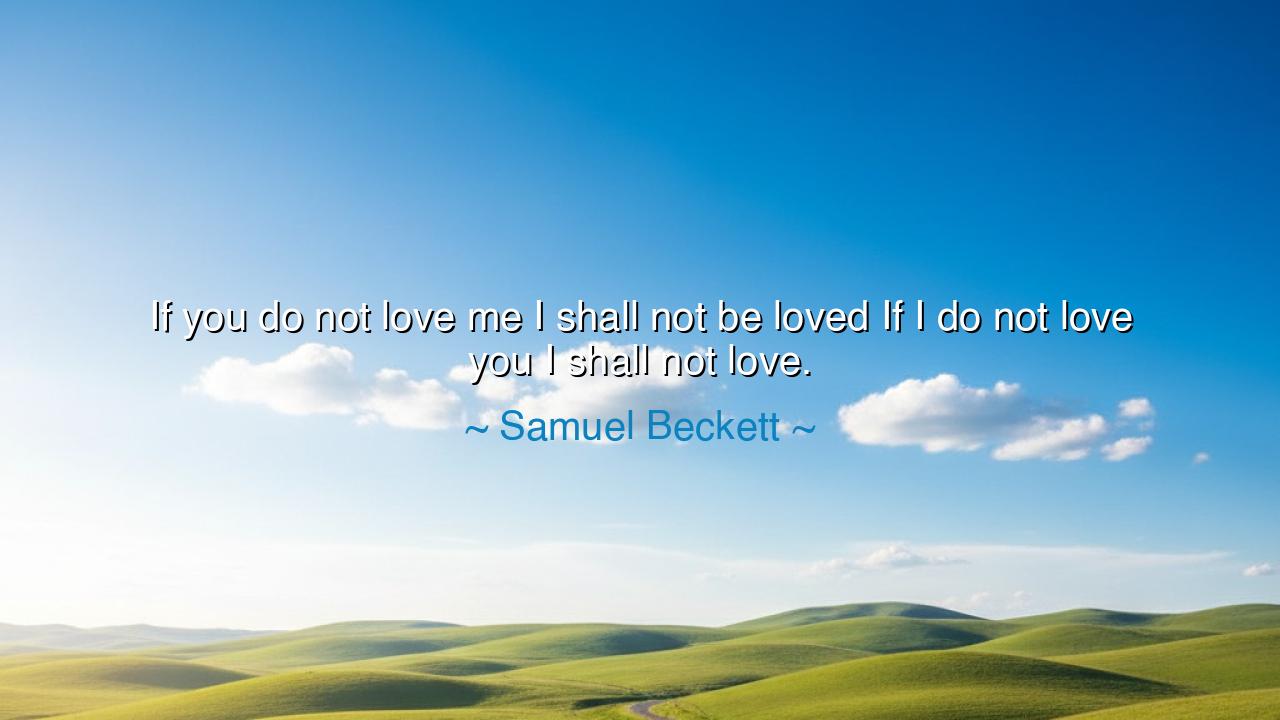
If you do not love me I shall not be loved If I do not love you I






"If you do not love me I shall not be loved. If I do not love you I shall not love." Ah, hear these words with the weight they carry, for they speak of a truth as old as the earth itself. Love is not a simple exchange between two hearts; it is a mutual force, a bond that is only whole when both parties give and receive in equal measure. It is not enough to sit in the stillness of your own heart, hoping for love to come to you, nor is it enough to love only in silence, expecting the world to somehow recognize and return it. Love requires action, both in the giving and in the receiving. Without love, love does not live, and without giving of yourself, love cannot truly be known.
Let us consider the noble story of Orpheus and Eurydice, whose love was so deep that it transcended the very gates of death. Orpheus, with his divine music, descended into the underworld, seeking to retrieve his beloved from the clutches of death. But, as the myth goes, the moment he doubted Eurydice’s presence and turned to look at her, she was lost forever. Love requires belief—not only in the other person but also in the love itself. Orpheus's failure to trust that his love could endure without proof led to the loss of the very thing he sought. This story teaches us that love cannot exist if one does not believe in its power, and that both parties must give themselves fully to the bond.
The wisdom in Samuel Beckett's words calls us to recognize this reciprocal nature of love. If one heart is closed, the other cannot fully open. Just as the earth cannot produce fruit without the seed being planted, so too does love require an exchange of openness, trust, and vulnerability. You cannot be loved if you do not open yourself to love, and similarly, you cannot love if you close your heart to the object of your affection. The giving of love and the receiving of love are not mere gestures; they are acts of mutual existence. In the space where love is exchanged, both hearts are transformed.
Think of the humble Leonidas, the Spartan king whose love for his people and his country propelled him to lead his warriors to certain death at the Battle of Thermopylae. His love was not born out of selfish desire, nor did it seek any glory for himself. Instead, his love was given freely to his people, as he stood with them in their darkest hour. But his people’s love for him, their loyalty to their king, was what enabled them to make that sacrifice. Love, like Leonidas's sacrifice, is not one-sided; it is a force that exists when both hearts are open. The Spartan warriors gave their lives, and in turn, they gave their king their undying love and respect. It was in the act of mutual giving that their love for one another was made clear to all the world.
Yet, it is important to remember that love does not come without risk, and it is not always easy. To love and to be loved is to place oneself at the mercy of another’s heart, to open one’s soul to potential hurt, but also to the possibility of joy. If we close ourselves off, we deny the world the chance to love us, and we, in turn, deny ourselves the chance to love fully. Love is a force, and as with all powerful forces, it requires the courage to give and to receive without the assurance of return. This is where the true wisdom of Beckett's words lies: love is a dance, an exchange, a mutual act of giving that cannot thrive if it is lopsided or withheld.
The lesson is clear, dear ones: if you withhold love, you will find yourself unloved, and if you do not love, you will never truly experience the fullness of love. To love, truly and deeply, is to give without hesitation, to open the heart fully to another, and to trust that the bond will be returned. In relationships, whether they are romantic, familial, or even the love shared between friends, the act of loving must be reciprocal, for only then will it flourish. Love is a river, and it must flow freely in both directions, from one heart to another, or it will stagnate and die.
So, I urge you, in your lives: do not hold back your love, for it is the greatest gift you can give to another. Open your heart to the world and to those around you, and give freely without fear or expectation. Let love flow, unguarded and pure, and trust that in giving, you shall also receive. Only then will you understand the true nature of love: not something to be taken, but something to be given, freely, without reservation, and without the need for anything in return. In the act of giving, you will find that love will come back to you, and you shall truly know what it is to love and to be loved.






AAdministratorAdministrator
Welcome, honored guests. Please leave a comment, we will respond soon